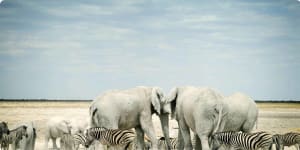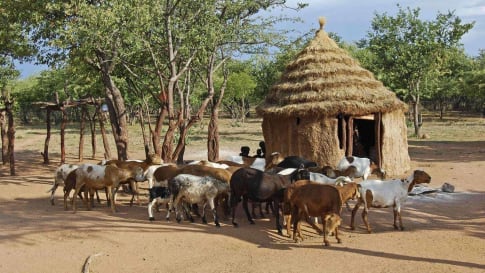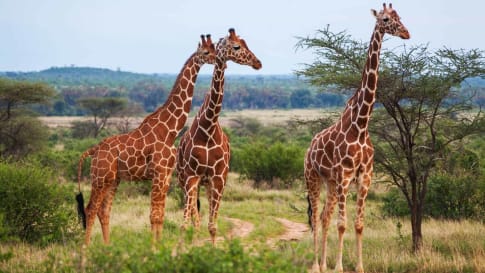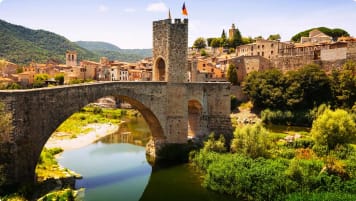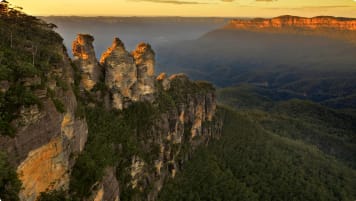Namibia Wildlife and Culture Tour for Seniors
A small group tour for seniors and couples to Southern Africa for couples and solo travellers. Namibia shares borders with Angola and Zambia to the north, Botswana to the east and South Africa to the south and east. Wedged between the Kalahari and the South Atlantic, Namibia is home to the oldest desert of the earth. Despite its parched reputation, Namibia is one of the world’s best wildlife destinations.
From $10,606CAD
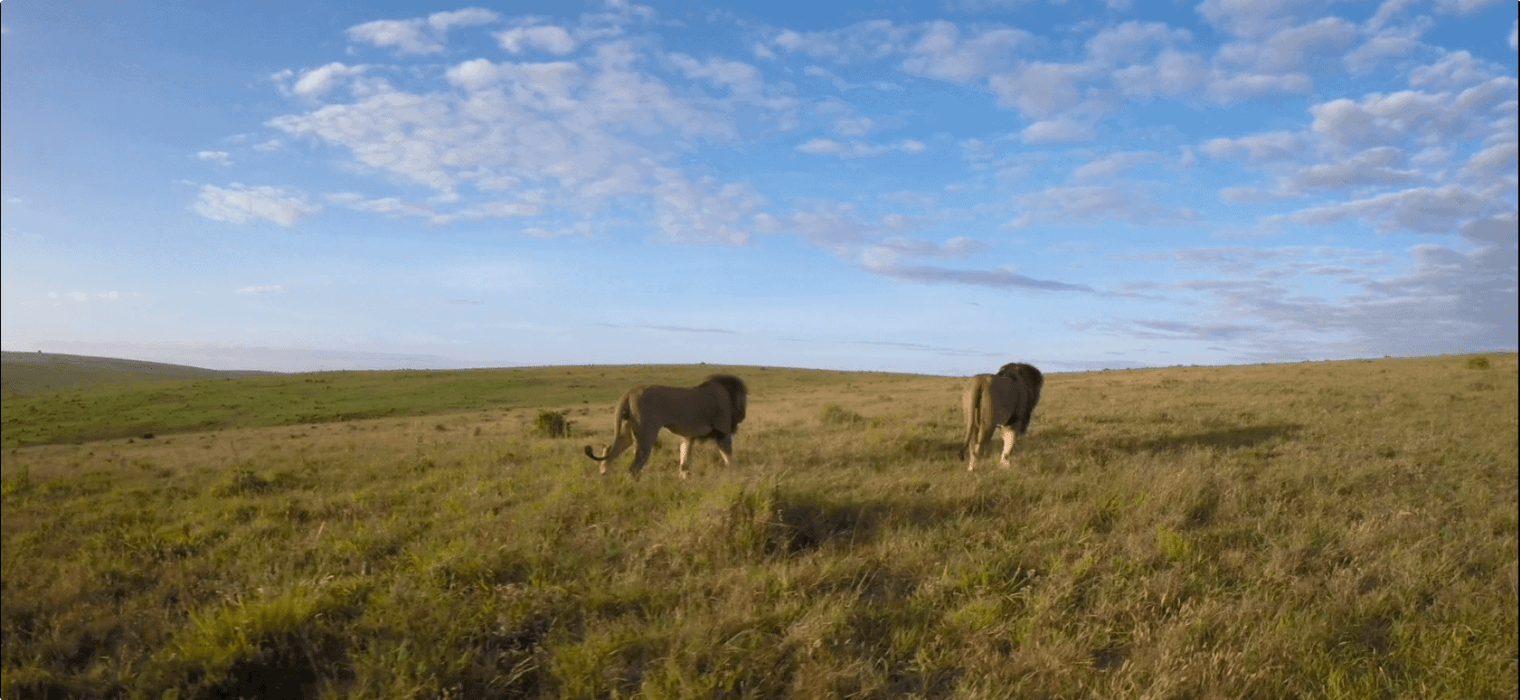
Highlights
- 1. Explore the remarkable sights of the Namib Desert.
- 2. Marvel at Sossusvlei’s gigantic star-shaped mountains of sand.
- 3. Discover the unexpected proliferation of German-style buildings and the European cafe culture of Windhoek.
- 4. Visit the port town Walvis Bay, situated at a wide lagoon with innumerable sea birds, pelicans, and flamingos.
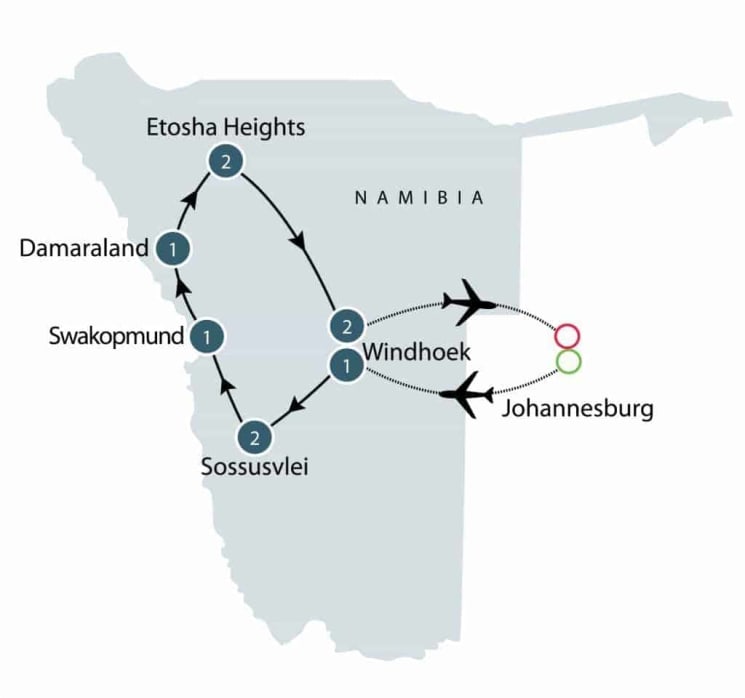
Departure Dates
| Departure Date | Price |
|---|---|
| 12 September 2024 Ends 21 September 2024 • 10 days $10,606 Twin $11,422 Single Available | Selected |
| 11 September 2025 Ends 20 September 2025 • 10 days $11,141 Twin $12,198 Single Available | |
| 10 September 2026 Ends 19 September 2026 • 10 days $11,141 Twin $12,198 Single Available |
Namibia Wildlife Tour
Odyssey offers easy, convenient, and relaxed escorted small group tours across Namibia and beyond into Africa. We explore Namibia's incredible natural beauty and some truly spectacular scenery along the way. This and more is all waiting to be explored on one of Odyssey’s small group tours of Namibia, designed for the senior traveller, and led by experienced, and enthusiastic like minded people.
This Namibia wildlife and cultural tour explores a country that shares its borders with Angola and Zambia to the north, Botswana to the east, and South Africa to the south and east. Wedged between the Kalahari and the South Atlantic, Namibia is home to the oldest desert of the Earth. Despite its parched reputation, Namibia is one of the world’s best wildlife destinations. This escorted small group tour exploring the wildlife and culture of Namibia may be taken on its own or combined with other tours. The tour can also be an extension to Odyssey’s Southern Africa Wildlife Adventure or Madagascar tour.
Itinerary: focused on Namibia wildlife and culture
The small group tour to Namibia for 9 days begins in Windhoek, the capital of Namibia. The charm of Windhoek lies in its harmonious blend of African and European cultures and its people's friendliness. Ever since the country achieved independence in 1990, it has been characterised by a vitality born of a sense of freedom and pride in self. Windhoek is one of the cleanest capitals in Africa. It offers all modern amenities that conform to some of the world’s highest standards.
- Our first stop is Namib Naukluft National Park.
- The remainder of our tour explores the West coast of Namibia, then Etosha, and then back to Windhoek.
Other highlights of this tour of the wildlife and culture of Namibia includes;
- strolling among the rock art at Twyfelfontein. This gained UNESCO World Heritage status in 2007,
- marvelling at Sossusvlei’s gigantic star-shaped mountains of sand.
- We also discover the unexpected proliferation of German-style buildings and the European cafe culture of Windhoek,
- as well as enjoying a cruise of Walvis Bay, a wide lagoon with innumerable sea birds, pelicans, and flamingos.
This escorted small group tour to Namibia is for the senior or mature couples or solo traveller seeking to learn about and understand Namibia's cultural heritage, history, it's people and their way of life, as well as see the wildlife.
For more details about the Namibia wildlife and culture tour, then please click the ‘Top 5’ or ‘Itinerary’ buttons above! If you’re keen to experience this tour, please call or send an email. Or, to book, simply fill in the form on the right hand side of this page.
Gallery
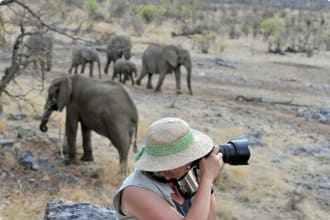
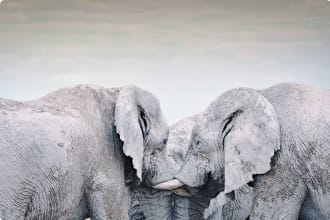
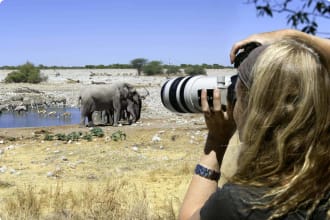
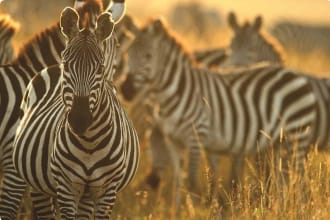
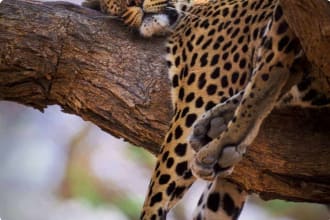
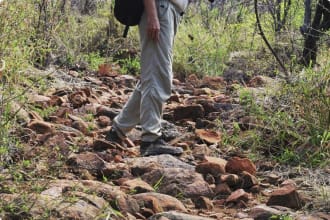
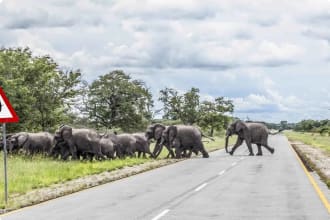
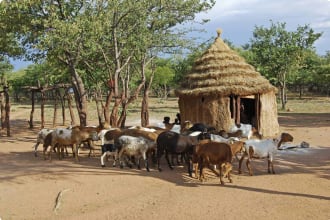
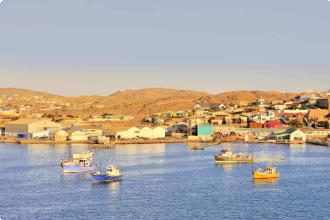
Itinerary
10 days
Day 1: Windhoek
Accommodation: Hilton Hotel or similar
Today we arrive at Johannesburg airport for our flight into Windhoek International Airport Here we meet our English Speaking Driver and transfer to the hotel.
Welcome dinner at the hotel.
(D)
Day 2: Windhoek - Sossusvlei
Accommodation: Moon Mountain Lodge or similar
Breakfast at the hotel.
After breakfast we meet our local guide and depart Windhoek, driving southwest through the scenic Khomas Hochland highlands before heading down the Great Escarpment into the Namib Desert below, stopping for a picnic lunch at a scenic location along the way.
We will arrive at our lodge in the mid-afternoon.
If there is still time today, we will visit Sesriem Canyon, a nearby geological attraction. However, if you prefer, you can just relax and soak in the scenic and tranquil surroundings at the lodge.
Dinner at the lodge.
(B, D)
Day 3: Sossusvlei
Accommodation: Moon Mountain Lodge or similar
Breakfast at the lodge.
This morning you will rise early for a magical excursion with your guide into the Namib Naukluft National Park.
We will enter the Park gates at sunrise to capture the dunes whilst the light is soft and shadows accentuate their towering shapes and curves. This area boasts some of the highest free-standing sand dunes in the world. Your guide will give you an insight on the formation of the Namib Desert and its myriad of fascinating creatures and plants that have adapted to survive these harsh environs.
Once you have explored to your hearts content you can enjoy a relaxing picnic breakfast under the shade of a camel thorn tree.
Return to Namib Naukluft lodge in the early afternoon for a late lunch, stopping off to view Sesriem Canyon if you haven’t already done so the day before.
The rest of the afternoon is at your leisure (from experience, this is usually welcomed after an exhilarating morning in the dunes).
Dinner at the lodge.
(B, L, D)
Day 4: Swakopmund
Accommodation: Swakopmund Hotel or similar
Breakfast at the lodge.
The fascinating drive today takes you northwest through awesome and ever changing desert landscapes of the Namib Naukluft National Park, including the impressive Gaub and Kuiseb canyons.
You will meet the coast at the port town of Walvis Bay and then continue north to Swakopmund where you can enjoy the pleasant seaside location and cooler coastal air.
There will be time this afternoon to explore the town and wander along the waterfront on foot
Dinner will be at The Tug, a popular restaurant which specialises in fresh seafood.
(B, D)
Day 5: Damaraland
Accommodation: Damaraland Camp (Adobe-styled Thatched Units) or similar
Breakfast is at the hotel.
Continuing on our safari today, the road takes us north and east into the wonderful and diverse region of Damaraland.
We’ll pass Namibia’s highest mountain, the Brandberg which peaks at 2,573 m above sea level, and take time to view game and absorb the vastness of the scenery along the way. Damaraland is typified by displays of colour, magnificent table topped mountains, rock formations and bizarre-looking vegetation.
The present day landscape has been formed by the erosion of wind, water and geological forces which have formed rolling hills, dunes, gravel plains and ancient river terraces. It is the variety and loneliness of the area as well as the scenic splendour which will reward and astound you, giving an authentic understanding of the word ‘wilderness’.
If time allows this afternoon our guide will take us to visit the nearby attractions and geological sites of the pre-historic Twyfelfontein rock engravings (a UNESCO World Heritage Site) – if not, there is plenty of time to see them tomorrow.
Dinner at the camp.
(B, D)
Day 6: Etosha Heights
Accommodation: Safarihoek Lodge or similar
After an early breakfast at the camp, you set off on your journey to the Etosha Heights area, travelling via the scenic Grootberg Pass.
Along the way our guide will take us to visit a local Himba settlement
We may have to search for a while as the semi-nomadic Himba people sometimes move location with no notice. They are one of the last truly traditional peoples of Namibia and have little time for conventional practices.
Here we will learn about the customs and traditions of this very proud nation, and will be given insight into their beliefs, way of life and everyday routine. We will also visit the Grootberg Primary School.
After visiting the Himba and school we will head east through the small town of Kamanjab before heading on towards tonight’s destination at Safari Hoek on the southern border of Etosha in the early afternoon.
The rest of the day can be spent relaxing at the camp’s floodlit waterhole whilst contemplating the fascinating impressions of the day. Later you will join an afternoon drive on the private Safari Heights Reserve.
(B, D)
Day 7: Etosha Heights
Accommodation: Safarihoek Lodge or similar
Breakfast at the lodge.
Today we will be treated to an exciting morning game drive into the private Etosha Heights Game reserve to see more of the wide variety of game and bird species that are to be found there before returning for lunch.
Lunch at the lodge.
There is then time to relax by the refreshing swimming pool before we head out again for an afternoon game drive.
We also have the option to simply relax and watch game come and go from the lodge’s hides overlooking the active waterhole. This makes for some good photographic opportunities.
Dinner at the lodge.
(B, L, D)
Day 8: Omaruru
Accommodation: Hilton Hotel or similar
Breakfast at the lodge.
Today you depart Safarihoek Lodge and make your way back to Windhoek.
Time permitting we may detour via the Etosha National Park for late morning game drive inside the park and picnic lunch.
You then return by road to Windhoek, arriving late afternoon in time for your farewell dinner with your guide included.
Dinner at the lodge.
(B, L, D)
Day 9: Windhoek
Accommodation: Hilton Hotel or similar
Breakfast at the lodge.
Day at Leisure
(B)
Day 10: Windhoek - Johannesburg
Breakfast at the hotel.
Today we transfer to the airport for our flight back to Johannesburg. Our tour concludes on arrival at Johannesburg airport.
Tour Notes
- Due to flight schedules, most Australian cities may require 1 additional night in Johannesburg.
- Group size limited to 12
Includes / Excludes
What’s included in our Tour
- Return flights from Johannesburg to Windhoek in economy class.
- 9 nights of mixed accommodation.
- 9 breakfasts, 3 lunches, and 7 dinners.
- Entrance fees at all parks visited in Namibia.
- Mineral water on board the vehicle.
- Transport in air-conditioned coach.
- English-speaking guide.
What’s not included in our Tour
- International airfares and departure taxes.
- Additional charges may apply to passengers who are not participating in both the Southern Africa Wildlife Adventure and Namibia.
- Meals not specified.
- All visits and activities that are optional or not stated on itinerary.
- All personal expenses such as drinks, telephone, laundry, etc.
- Travel insurance.
Participants must be able to carry their own luggage, climb and descend stairs, be in good health, mobile and able to participate in 3-5 hours of physical activity per day, the equivalent of walking / hiking up to 8 kilometers per day on uneven ground.
Book now
Make it a private tour
Easing your journey
Crossing international borders with restrictions
The list of requirements to travel internationally has changed and will continue to change for several years. Odyssey is here to assist you in managing your way through these requirements:
For more information see our Crossing international borders with restrictions page.
Book With Confidence
If less than 30 days before your tour starts you are unable to travel as a result of Government travel restrictions, Odyssey Traveller will assist you with a date change, provide you with a credit or process a refund for your booking less any non-recoverable costs.
See Terms and conditions for details.
Peace of Mind Travel
The safety of our travellers, tour leader, local guide and support staff has always been our top priority and with the new guidelines for public health and safety for keeping safe for destinations around the world, we’ve developed our plan to give you peace of mind when travelling with us.
See Peace of Mind Travel for details.
Reading List Download PDF
History of Namibia: From the Beginning to 1990
Marion Wallace
In 1990 Namibia gained its independence after a decades-long struggle against South African rule--and, before that, against German colonialism. This book, the first new scholarly general history of Namibia in two decades, provides a fresh synthesis of these events, and of the much longer pre-colonial period. A History of Namibia opens with a chapter by John Kinahan covering the evidence of human activity in Namibia from the earliest times to the nineteenth century, and for the first time making a synthesis of current archaeological research widely available to non-specialists. In subsequent chapters, Marion Wallace weaves together the most up-to-date academic research (in English and German) on Namibian history, from the mid-eighteenth century to the present. She explores histories of migration, production and power in the pre-colonial period, the changes triggered by European expansion, and the dynamics of the period of formal colonialism. The coverage of German rule includes a full chapter on the genocide of 1904-8. Here, Wallace outlines the history and historiography of the wars fought in central and southern Namibia, and the subsequent mass imprisonment of defeated Africans in concentration camps. The final two chapters analyse the period of African nationalism, apartheid and war between 1946 and 1990. The book's conclusion looks briefly at the development of Namibia in the two decades since independence. A History of Namibia provides an invaluable introduction and reference source to the past of a country that is often neglected, despite its significance in the history of the region and, indeed, for that of European colonialism and international relations. It makes accessible the latest research on the country, illuminates current controversies, puts forward new insights, and suggests future directions for research. The book's extensive bibliography adds to its usefulness for scholar and general reader alike.
Sands Of Silence: On Safari In Namibia
Peter Hathaway Capstick
From the successor to Ruark and Hemingway comes the most lavishly illustrated, historically important safari ever captured in print.
Peter Hathaway Capstick journeyed on safari through Namibia in the African spring of 1989. This was a nation on the eve on independence, a land scorched by sun, by years of bitter war. In these perilous circumstances, Peter Capstick commences what is surely the most thrilling safari of his stories career. He takes the reader to the stark landscape that makes up the Bushmen's tribal territories. There, facing all kinds of risks, members of the chase pursue their quarry in a land of legend and myth. the result is an exciting big-game adventure whose underlying themes relate directly to the international headlines of today.
In this first person adventure, Capstick spins riveting tales from his travels and reports on the Bushmen's culture, their political persecution, and the Stone Age life of Africa's original hunter-gatherers. In addition, the author explains the economic benefits of the sportsman's presence, and how ethical hunting is a tool for game protection and management on the continent.
Not since Peter Capstick's Africa has the author taken the reader along on safari. In this superbly illustrated book, Capstick returns to the veld with an ace video cameraman and leading African wildlife photographer Dr. M. Philip Kahl. one hundred of Dr. Kahl's striking color photos capture perfectly life and death in the "land of thirst."
The Black Rhinos of Namibia: Searching for Survivors in the African Desert
Rick Bass
“An extraordinary exploration and meditation . . . [Bass] transports us along on this wonder-filled tour, full of hardness and hope, into an otherworldly place that mirrors our own.” —National Geographic Traveler
Black rhinos are not actually black. They are, however, giant animals with tiny eyes, feet the diameter of laundry baskets, and horns that are prized for both their aesthetic and medicinal qualities. Until recently, these creatures were perched on the edge of extinction, their numbers dwindling as they succumbed to poachers and the ravages of civil war. Now their numbers are rising, thanks to a groundbreaking new conservation method from the Save the Rhino Trust: make sure that rhinos are worth more alive than dead.
Rick Bass, who has long worn the uneasy mantle of both activist and hunter, traveled to Namibia to find black rhinos. The tale of his journey provides a deeper understanding of these amazing animals and of just what needs to be done to protect them.
“Bass provides a singularly thoughtful portrait of a unique animal, and a meditation on mankind’s relationship to both it and the natural world as a whole.” —Minneapolis Star Tribune
Understanding Namibia: The Trials of Independence
Henning Melber
Since independence in 1990, Namibia has witnessed only one generation with no memory of colonialism - the 'born frees', who voted in the 2009 elections. The anti-colonial liberation movement, SWAPO, dominates the political scene, effectively making Namibia a de facto one-party state dominated by the first 'struggle generation'.
While those in power declare their support for a free, fair, and just society, the limits to liberation are such that emancipation from foreign rule has only been partially achieved. Despite its natural resources Namibia is among the world's most unequal societies and indicators of wellbeing have not markedly improved for many among the former colonized majority, despite a constitution enshrining human rights, social equality, and individual liberty.
This book analyses the transformation of Namibian society since Independence. Melber explores the achievements and failures and contrasts the narrative of a post-colonial patriotic history with the socio-economic and political realities of the nation-building project. He also investigates whether, notwithstanding the relative stability prevailing to date, the negotiation of controlled change during Namibia's decolonization could have achieved more than simply a change of those in control.
Conflict and Costume: The Herero Tribe of Namibia
Jim Naughten
The magnificent traditional costume of the Herero of Namibia, southern Africa, is a stark reminder of the country’s tumultuous past. In the late 19th century, the influence of missionaries and traders in German Southwest Africa led to the adoption by the Herero of the European dress of the day. Over time, the voluminous gowns, completed by a cattle-horn-shaped headdress, came to represent the cultural identity of the Herero women. The men’s ceremonial dress also harks back to colonial times: following the brutal war of 1904, the Herero adapted the uniforms of German soldiers for their own Otruppe ('troops') movement. In Conflict and Costume, acclaimed photographer Jim Naughten captures the colorful Herero attire in a series of spectacular portraits. Set against the Namibian landscape, these dramatic images show the striking costumes and their proud owners to full effect: men in elaborate, home-made paramilitary uniforms, and women in spectacular floor-length frocks with matching horns. Dr Lutz Marten contributes an insightful text that places the dress in its historical context.
Africa: A Modern History
Guy Arnold
The end of the Second World War signalled the rapid end of the European African empires. In 1945, only four African countries were independent; by 1963, thirty African states created the Organization of African Unity. Despite formidable problems, the 1960s were a time of optimism as Africans enjoyed their new independence, witnessed increases in prosperity and prepared to tackle their political and economic problems in their own way.
By the 1990s, however, the high hopes of the 1960s had been dashed. Dictatorship by strongmen, corruption, civil wars and genocide, widespread poverty and the interventions and manipulations of the major powers had all relegated Africa to the position of an aid 'basket case', with some of the world's poorest and least-developed nations.
By exploring developments over the last fifteen years, including the impact of China, new IT technology and the Arab Spring, the rise of Nigeria as Africa's leading country and the recent refugee crisis, Guy Arnold brings his landmark history of modern Africa up to date and provides a fresh and insightful perspective on this troubled and misunderstood continent.
